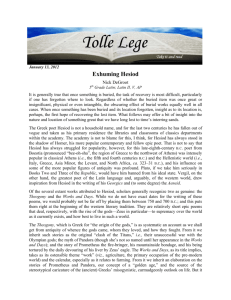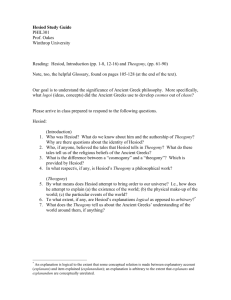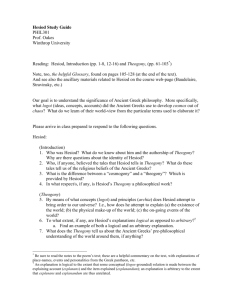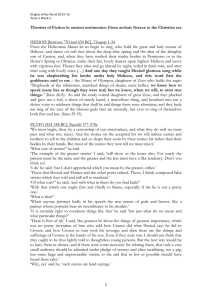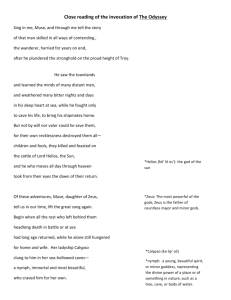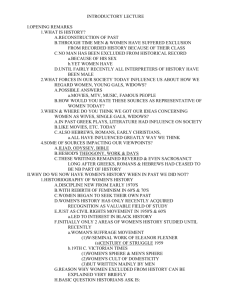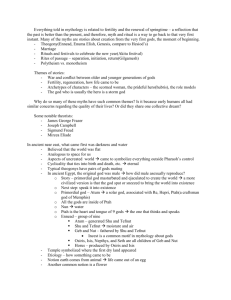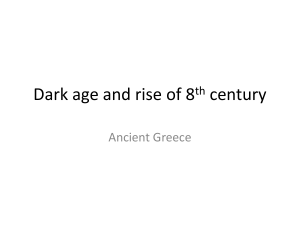1 Rubaiyat Khan 21H.301 “Works and Days”
advertisement
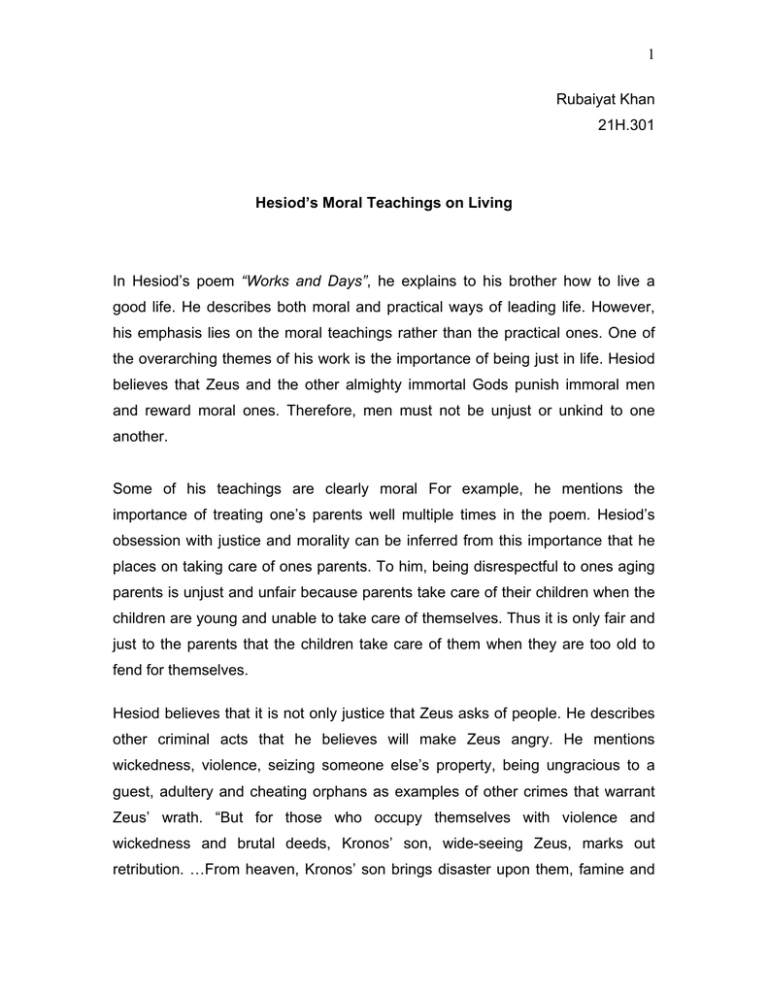
1 Rubaiyat Khan 21H.301 Hesiod’s Moral Teachings on Living In Hesiod’s poem “Works and Days”, he explains to his brother how to live a good life. He describes both moral and practical ways of leading life. However, his emphasis lies on the moral teachings rather than the practical ones. One of the overarching themes of his work is the importance of being just in life. Hesiod believes that Zeus and the other almighty immortal Gods punish immoral men and reward moral ones. Therefore, men must not be unjust or unkind to one another. Some of his teachings are clearly moral For example, he mentions the importance of treating one’s parents well multiple times in the poem. Hesiod’s obsession with justice and morality can be inferred from this importance that he places on taking care of ones parents. To him, being disrespectful to ones aging parents is unjust and unfair because parents take care of their children when the children are young and unable to take care of themselves. Thus it is only fair and just to the parents that the children take care of them when they are too old to fend for themselves. Hesiod believes that it is not only justice that Zeus asks of people. He describes other criminal acts that he believes will make Zeus angry. He mentions wickedness, violence, seizing someone else’s property, being ungracious to a guest, adultery and cheating orphans as examples of other crimes that warrant Zeus’ wrath. “But for those who occupy themselves with violence and wickedness and brutal deeds, Kronos’ son, wide-seeing Zeus, marks out retribution. …From heaven, Kronos’ son brings disaster upon them, famine and 2 with it plague, and the people waste away. … ” (Hesiod, Works and Days, pp. 44). Most of these transgressions have one thing in common – they are unjust towards other people. For example, a man who commits adultery is being unjust to his wife, while one who seizes someone else’s property is being unjust to the rightful owner of the property. Thus we see that Hesiod is very concerned with justice and righteousness and believes that Zeus harshly punishes anyone who does injustice to another person. A third moral teaching Hesiod provides in “Works and Days” is that cheating, that is getting something by means other than hard work, is immoral; hence men must refrain from cheating. He narrates a mythical story to make his audience understand the consequences of cheating. He describes the story of Pandora: Prometheus cheated the Gods, and as a penalty, the Gods seized fire from earth. Prometheus further wronged the Gods by stealing fire back from Olympus. As a punishment for this heinous crime, the God’s created a charming woman, Pandora, and sent her to earth along with a jar full of trouble. Once Pandora unleashed the trouble, it not only afflicted the criminal Prometheus, but also brought trouble on the rest of mankind. Through this example, Hesiod is trying to teach his audience how cheating and unjust behavior have grave penalties not only for the rogue, but also for his entire society. Here, Hesiod draws an implicit parallelism between Prometheus and Perses, who cheated Hesiod out of his fair share of inheritance. Hesiod is warning Perses that he will have to suffer for cheating Hesiod out of his inheritance. Hesiod also warns the local chiefs who allowed Perses to get away with conning Hesiod “lords … keep your pronouncement straight, you bribe swallowers, and forget your crooked judgment altogether…. The eyes of Zeus, that sees everything and notices everything …” (Hesiod, Works and Days, pp. 44, 45). Thus, through the story of Pandora, Hesiod is asking his fellow citizens and his brother to become honest and moral. In the poem, Hesiod provides a detailed account of how to honor and respect Zeus and the other Gods, which is definitely a form of moral teaching. He says 3 “Make sacrifice to the immortal gods …” (Hesiod, Works and Days, pp. 47). He also says “Never pour gleaming wine to Zeus in the morning with unwashed hands, or to other immortals …” (Hesiod, Works and Days, pp. 58). According to him, the consequence of not honoring the immortal Gods is self-destruction. He cites the example of the silver race of men who were “put away by Zeus son of Kronos, angry because they did not offer honor to the blessed gods who occupy Olympus” (Hesiod, Works and Days, pp. 41). Hesiod’s teachings described above are undoubtedly moral. But some of his moral teachings appear practical on the surface. A deeper analysis of such ostensibly practical teachings shows that they are, in fact, fundamentally moral. For example, he asks Perses always to keep two ploughs at the farm. The moral reason behind this seemingly practical advice is that Hesiod believes humans are powerless and they should be continually prepared to fend off minor misfortunes that Gods may throw in their way. Thus, having two ploughs is necessary because Zeus might want to destroy one. Similarly, he asks Perses to build the huts for his laborers in summer because Zeus may change the weather to winter sooner than expected and the laborers will then need the huts to survive. These practical advices are therefore given in the moral context of Hesiod’s belief that humans are as helpless in the hands of Gods as puppets are in the hands of a puppeteer, and the best a human can do to survive a God’s whims is to prepare as much as possible. To illustrate this powerlessness of humans, Hesiod narrates the story of a little nightingale in the talons of a hawk. The hawk says to the nightingale “You are in the power of one much superior, and you will go whichever way I take you…. He is a fool who seeks to compete against the stronger. He both loses the struggle and suffers injury on top of insult” (Hesiod, Works and Days, pp. 43). Here, the hawk in the fable is a metaphor for the omnipotent Gods, and the nightingale stands for weak humans. To prove the powerlessness of humans, he also describes how absolutely powerful the Gods are. “Because of him [Zeus] mortal 4 men are unmentioned and mentioned, spoken and unspoken of, according to great Zeus’ will. For easily he makes strong, and easily he oppresses the strong … ” (Hesiod, Works and Days, pp. 37). A second seemingly practical teaching that has a moral basis underneath is Hesiod’s advice to Perses about working hard. On several occasions Hesiod tells Perses that he must be diligent in his work. He even tries to motivate Perses to work hard by telling him that only industry can make him wealthy and “wealth brings worth and prestige” (Hesiod, Works and Days, pp. 46). Hesiod’s moral reason for asking Perses to be industrious is not to make him wealthy. Rather he wants the Gods to be pleased with Perses as “Gods and men disapprove of men who live without working” (Hesiod, Works and Days, pp. 46). Another moral teaching obscured by the façade of practicality is the calendar of favorable dates that Hesiod presents at the end of the poem “Works and Days”. He advises his audience to keep track of these dates “Pay due attention to the days which comes from Zeus …” (Hesiod, Works and Days, pp. 59). Even though the calendar describes days for performing practical tasks, Hesiod provides it to its audience for a moral reason. Because Hesiod believes that men are powerless in the hands of the immortal Gods, he asks men to follow these God given dates so that they can be successful in their endeavors. He says “Well with god and fortune is he who works with knowledge of all this, giving the immortals no cause for offence, judging the bird-omens and avoiding transgression” (Hesiod, Works and Days, pp. 59). Why Hesiod dispenses moral teaching throughout his poem is clear. He believes that Zeus destroys immoral races and rewards moral ones. He tells his audience about the four races that Zeus destroyed because they were becoming progressively more evil and violent. He warns his contemporary fellow Greek citizens “Zeus will destroy this race [the race that Hesiod belongs to] of man also” (Hesiod, Works and Days, pp. 42). As an incentive for being moral, Hesiod 5 describes Zeus’ prizes to just and righteous people. He says that if the people in a community are just, their community will flourish and Zeus will prevent calamities like famine and blight from affecting them. As a reward for their moral behavior, Zeus will give these communities sufficient food, wealth and good children, and make sure that they never need to go out in the dangerous seas. To summarize, Hesiod’s moral teaching in “Works and Days” is that to lead a good life it is extremely important that a man is just and righteous and that he works hard to win his livelihood. But because men are powerless in the hand of Gods, for his hard work to be successful, he must honor the all-powerful Gods by partaking of actions on days that have been assigned for those actions. Lastly, men must avoid every action that can offend the almighty Gods in Olympus. Some of these advices are provided as moral teachings while some are shrouded by an aura of practicality. But basically, most of his advices in “Works and Days” have some sort of moral foundation. Therefore, Hesiod’s “Works and Days” is mostly concerned with moral, rather than practical teaching.
